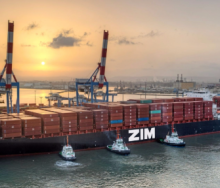Transnet National Ports Authority (TNPA) is forging ahead with the implementation of its recovery plan, which focuses on enabling efficient use of port infrastructure and improving operational efficiencies at central region ports.
TNPA highlighted the latest developments being implemented as part of its recovery plan at the ports of East London, Ngqura and Port Elizabeth at a meeting with port users on Wednesday.
Managing Executive for central region ports, Siyabulela Mhlaluka said the plan aimed to ensure the competitiveness of the ports by improving efficiency through ensuring robust port operations oversight, delivery of critical infrastructure, and investment in a reliable marine fleet.
TNPA told port users that its strategic initiatives for East London include the deepening and strengthening of N-berth, the replacement of two graving dock jib cranes for the ship repair facility and the acquisition of two tugboats.
These initiatives are aimed at boosting the river port’s marine infrastructure and fleet availability to enable key sectors of the local economy.
The N-Berth construction project has commenced and will be completed in October this year, TNPA said.
As part of the plan, the Port of East London’s automotive terminal berth capacity will be expanded to allow for the berthing of modern automotive carriers, while the Port of Ngqura has taken delivery of two of six additional hydraulic tension mooring units that have been operationalised to curb shipping delays caused by inclement weather conditions.
In line with the central region’s focus on enabling the local fishing industry in Nelson Mandela Bay, the project pipeline for the Port of Port Elizabeth includes the completed upgrade of the 1200-tonne slipway and the refurbishment of the Dom Pedro Quay, which is scheduled to start at the end of February 2024.
The port will also benefit from eight of the 52 hydraulic tension units that have been procured for ports.
TNPA said its recovery plan for the central ports is aligned with Transnet group’s overall plan, which aims to improve operations and financial sustainability while driving efficiency across the business over 18 months to the end of the 2024/25 financial year.













